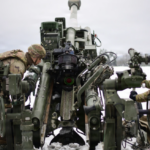
The Pentagon’s acquisition chief said Tuesday a potential government shutdown would be “extremely disruptive,” citing impacts to testing and acceptance of new equipment. Bill LaPlante, under secretary of defense for acquisition and sustainment, offered his perspective as Congress has just days to consider a continuing resolution (CR) to avoid a shutdown and allow both the House and Senate more time to work on passing final fiscal year 2024 appropriations bills. “There’s two different things, right, [and] they’re both bad. One…

 By
By 











